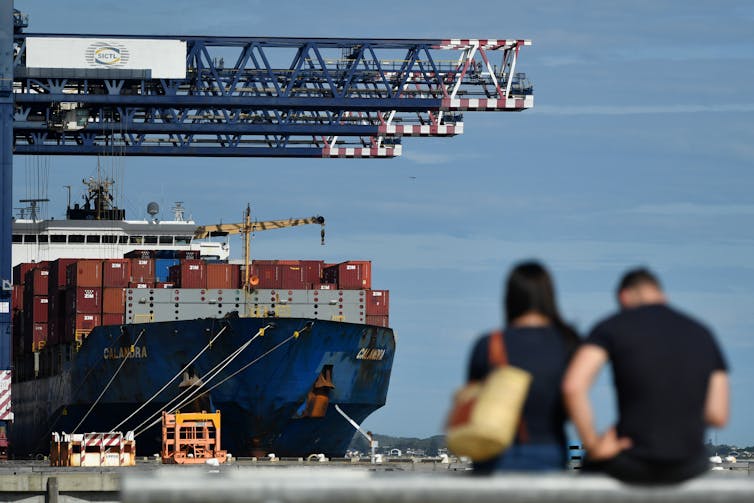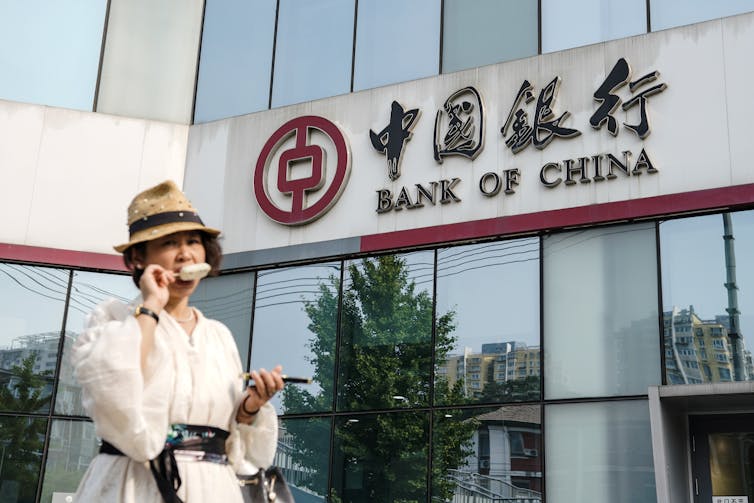China reportedly wants to do more deals in its own currency. Australia’s banks aren’t ready
- Written by The Conversation
In October, media reports suggested mining giant BHP had accepted a deal to settle about a third of its spot iron ore sales to Chinese customers in China’s own currency, the renminbi (RMB), rather than US dollars.
Those reports still haven’t been officially confirmed, amid ongoing closed-door negotiations between the mining company and China’s state-owned iron ore buyer, China Mineral Resources Group (CMRG).
But headlines quickly jumped to the spectre of “de-dollarisation” and geopolitical turning points.
The reality is less dramatic, but in some ways, more important for Australia.
Changing the invoicing currency doesn’t change how much iron ore China buys. What it changes is who carries the currency risk, which banking systems sit in the middle, and which financial centres earn the fees, deposits and lending business that flow from that trade.
In a new report released today, we find RMB use in Australia is still surprisingly modest. But BHP’s reported deal matters because it exposes how unprepared many Australian banks and firms are for a future where China’s currency plays a much larger role.
The US dollar still dominates
Given China is by far Australia’s largest trading partner, you might expect its currency to loom large in our trade data. It doesn’t.
Australian Bureau of Statistics invoicing data show only a sliver of Australia’s imports and exports are settled in RMB. In the 2023-24 financial year, only 1.4% of merchandise imports by value were invoiced in RMB, and 0.2% of exports.
Across Australia’s total merchandise trade with the world, the Australian dollar (AUD) and US dollar (USD) still dominate.
Even in Australia’s trade with China, RMB settlement has grown only cautiously. It is far more common on the import side (consumer goods and intermediate inputs) than for bulk commodity exports, such as iron ore.
That’s why reports of a deal with BHP drew so much attention. Iron ore is the backbone of Australia’s exports – worth more than A$100 billion a year.
If settling transactions in RMB became the standard for a significant slice of that trade, the flows involved would dwarf today’s RMB usage in Australia’s financial system.

We built the plumbing – but not the capability
You might think we would be well placed to do more business in China’s currency. Over the past decade, Australia has ticked many of the boxes you would associate with becoming an “RMB hub”.
We have a bilateral currency swap line with the People’s Bank of China – meaning our central banks can exchange currencies directly. There’s an official RMB clearing bank in Sydney – offering direct access to China’s onshore RMB and foreign exchange markets.
On paper, there’s also a supportive policy framework. Yet the on-the-ground reality is underwhelming.
As of mid-2025, total Australian investment in assets in onshore Chinese financial markets was about A$40 billion. This is tiny compared with Australian holdings of US securities (around A$180 billion) and still small relative to the scale of our trade with China.
Only a few dozen bonds denominated in RMB have been issued in Hong Kong, with relatively modest amounts outstanding.
Interviews with corporations for our report tell a consistent story. Australian firms that want to borrow, hedge or hold RMB often increasingly find it easier to do so through Chinese banks.
They either transact through the Australian branches of the Chinese banks, or in Hong Kong and Shanghai.

Who gets to cash in?
If more transactions come to be conducted in China’s currency, the most interesting question for Australia is: where does that business land?
If RMB settlements are routed mainly through Chinese banks, then a growing share of the fees, deposits and lending associated with Australia–China trade will sit on their balance sheets, not those of Australian institutions.
Over time, that could erode the role of Australian banks in servicing the country’s largest trading relationship.
There are also implications for regulators. Greater use of RMB in big-ticket exports would deepen Australia’s financial linkages with China’s currency and banking system.
That brings commercial opportunities, but also new channels of vulnerability in a world of sanctions, financial fragmentation and geopolitical tension.
Balancing opportunities and risks
BHP is unlikely to be the last major exporter to consider RMB settlement. As Chinese manufacturers, electric vehicle makers and renewable energy companies expand their presence in Australia, more firms will have both revenues and costs tied, directly or indirectly, to China and its currency.
For Australian banks, the RMB needs to be treated less as an exotic add-on and more as a core capability, alongside the US dollar and the euro. Otherwise, Australian corporations will keep bypassing them in favour of Chinese banks.
For the Australian government, the task is to join up trade and financial policy. If Canberra is serious about both diversifying trade and stabilising relations with China, then RMB usage cannot be left entirely to foreign banks and overseas markets.
For businesses, the RMB is above all a practical tool. It can reduce currency mismatch when both customers and suppliers are in China, and sometimes improve commercial terms.
But it also comes with political and financial stability risks that need to be understood, stress-tested and managed.














